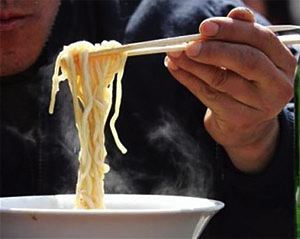Hits and Misses
 What you shouldn’t eat: Instant noodles drive metabolic syndrome (at least in Korean women).
What you shouldn’t eat: Instant noodles drive metabolic syndrome (at least in Korean women).
Who would have thought this was the case: Some bee pollen weight loss products are a…scam.
Don’t watch what your workers eat: Non-diet approach to weight management more effective in worksite wellness programs.
However, you can lose weight eating sour milk: Yogurt intake over long term linked to lower risk of becoming overweight.
Less exercise, not more calories, responsible for expanding waistlines.
Should a pharmacist run your corporate fitness program? Sure, it’s yet another job they are infinitely overqualified to perform.


Good to know about the yogurt and instant noodles. It seems like the diet that was tested was pretty bad all around, so I’m a little cautious about narrowing the focus to the noodles…but the conclusion is definitely what you would expect.
And the same goes for the yogurt!
The bottom line:
1) Watch what you eat. Yogurt good: instant noodles bad! Ingesting bee pollen doesn’t make up for eating too many packages of those instant noodles.
2) You can hire a pharmacist to run your corporate wellness program, but it’s a waste of his/her skills. Besides, employees hate being forced to exercise; but physical activity is what’s needed to metabolize the calories after eating instant noodles.
It should be a no brainer that anything “instant,” whether it be noodles or potatoes or anything else, will be bad for your health. Fast food carbs can wreak havoc on your body.
“Some Bee Pollen Weight Loss Products Are a Dangerous Scam”
Is there even any scientific evidence behind the claim that bee pollen can help with weight loss? Or is this one of the “magic cures” that Dr. Oz is in court right now defending.
It is likely that the eat for life plan works best because it isn’t focused on short term goals. Many wellness programs put the focus on losing weight within a certain time frame, and winning an award. Once the award is won, there is little incentive to continue to keep up a healthy lifestyle.
“Yogurt intake over long term linked to lower risk of becoming overweight”
Is this only when eating the disgusting plain yogurt, or does it also lower the risk when eating the sugar-laden flavored yogurt out on the market?
I have a hard time believing that consistent yogurt intake with high counts of sugar can lead to this conclusion.
“Less Exercise, Not More Calories, Responsible for Expanding Waistlines”
This is interesting, because I just read an article that said for every hour of sitting, you shave off an additional 20 minute from your life. Just imagine how long we could be living if we never sat down!
http://www.huffingtonpost.com/2011/08/17/1-hour-of-tv-lifespan-22-minutes_n_929321.html
Watching an hour of television is the same as smoking two cigarettes? What if — while watching TV — I munch on Doritos and smoke cigarettes? An hour spent watching TV could theoretically waste two hours of your life. One hour would be wasted watching TV, then you’d lose another hour in longevity. People used to call the TV the One-Eyed Monster. Maybe they should have called it the One-Eyed Grimm Reaper.
What if the people on TV are smoking while I am watching them? Important public-health research must be done!
I wouldn’t say “Not more calories”. People might start thinking that as long as they walk the dog they can now get that Phelps-like daily intake.
Truth is that you can *theoretically* have very high caloric intakes if you burn them.
Honestly the equation is always a simple one, not sure how it escapes so many people.
When (daily caloric intake) > (calories burnt) = you put on weight
When (daily caloric intake) < (calories burnt) = you lose weight
There are exceptions, but that's a solid rule of thumb